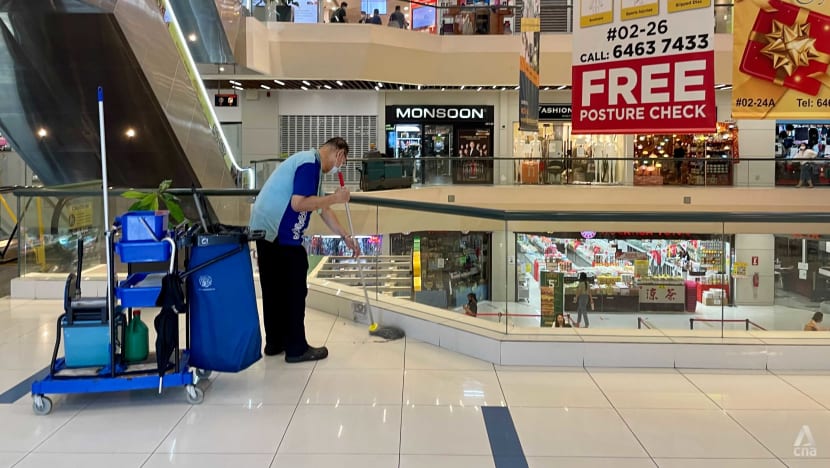Commentary: Value placed on low-wage workers is a price Singapore should pay for shared future
Singapore may need to accept higher prices and taxes to ensure no one is willingly left behind in a future filled with growth and prosperity, says Christopher Gee.

A cleaner mopping up Bukit Timah Plaza after rain seeped into the building on Aug 24, 2021. (Photo: Jeremy Long)
SINGAPORE: With eyes set on Singapore’s post-COVID future, Prime Minister Lee Hsien Loong’s National Day Rally on Sunday (Aug 29) set out the Government’s plans to tackle emergent societal fault lines.
The first highlighted was the stresses on lower-wage workers (LWW).
Even before the COVID-19 pandemic swept the globe, LWWs in Singapore and elsewhere have been under considerable strain for several years now because of new technological trends, disruption and globalisation.
But the pandemic has accentuated the situation gravely, impacting sectors with huge concentration of non-PMET workers like retail, F&B and accommodation more forcefully, leaving sales, services and clerical staff most prone to retrenchment, the Ministry of Manpower’s Labour Market Report 2020 pointed out.
LWWs in economically important sectors such as aviation, hospitality and tourism also lost their jobs and had to find alternative employment.
Meanwhile, many LWWs found themselves on the frontline of the societal response to the health crisis - essential workers key to keeping basic services going.
Without appropriate support, the setbacks to this vulnerable group could lead to a permanent underclass emerging, and seriously derail social cohesion and Singapore’s prospects of emerging stronger from the crisis.
Such a distinct separation of society into winners and losers damages the social compact that binds a society together.
It was timely therefore for PM Lee to set out several significant steps to improve the economic security of LWWs focused specifically on their employment income.
The major policy announcements for LWWs were in three critical areas: First, an extension in eligibility for the Workfare Income Supplement Scheme (WIS). Second, several measures to expand the Progressive Wage Model (PWM) to more industry sectors and specific occupations, and third, a more comprehensive Local Qualifying Salary regime.
INCREASING TAKE-HOME PAY FOR LOW-WAGE WORKERS
When implemented in the next two years, these measures will collectively increase the take-home pay of a larger number of LWWs and potentially propel productivity gains for businesses adopting the PWM.
In particular, the extension in eligibility for WIS to workers aged 30 years and above (from the current 35-year-old threshold) increases the financial support for younger LWWs, cushioning them from the ill-effects of heightened precarity and increasing their ability to save for tough times and provide for their retirement security in the long term.
The expansion of the PWM and more comprehensive Local Qualifying Salary regime to more industry sectors and occupations will allow more workers to climb productivity-supportive wage ladders to increase their earnings, while their employers benefit from productivity gains.
The roll-out of a Progressive Wage Mark (PW Mark) for businesses employing LWWs will send a powerful signal to both buyers of goods and services as well as potential job-seekers of the alignment of accredited businesses to the goal of progressive wages for their workers.
This signal will be reinforced by the Government (a major procurer of goods and services) buying only from suppliers with the PW Mark.

PROGRESSIVE WAGES KEY PART OF SINGAPORE’S WORK LANDSCAPE
There are two take-aways from this emphasis on progressive wages in this year’s National Day Rally.
The first is that the Government has decisively declared its position in the universal minimum wage versus incremental PWM debate and has doubled down on rolling out more aggressively the latter policies.
This Government has been consistent in its rejection of a universal minimum wage for Singapore, believing it will be too distortionary for the labour market and far too blunt a tool to effectively balance welfare gains for LWWs with the impact on economic dynamism.
However, with more sectors and occupations covered by PWM, and other foresighted businesses adopting such policies getting accredited with the PW Mark, de facto minimum wage floors would in any case be established by what is paid to workers in those sectors and occupations with progressive wages.
This effect would be enhanced if there are few barriers preventing workers shifting to jobs covered by PWM from those that are not.
SOCIETY PREPARED TO PAY THE PRICE
The second point was highlighted by Prime Minister Lee in his speech when he noted that higher wages would need to be accompanied by productivity gains underpinned by workers upgrading their skills and employers absorbing some of the increased costs.
While the Government can help defray some of the transitional costs of adopting PWM, a significant part of the increased costs would likely have to be shared with consumers.
This repricing of labour will lead to a gradual reset of all associated goods and services where labour is an input, and result in higher costs of living.
The Government’s support of LWWs, through larger WIS payments and other schemes to promote training and skills upgrading may also necessitate increases in taxation in the future.
The Prime Minister likened WIS to a negative income tax. But these transfers to LWWs would have to be financed by higher taxes levied on those with the best ability to pay, with higher incomes or wealth.
(Economists discuss how businesses can raise wages of low-income earners - without raising prices or passing costs to consumers on CNA's Heart of the Matter podcast published in October 2020.)
Higher prices for goods and services as well as higher tax rates need not be a bad thing, especially if accompanied by greater productivity and the creation of better jobs.
Singapore has experienced and thrived through numerous rounds of price adjustments alongside economic growth over the past 56 years.
Although the price of most goods and services including that for standard meals like bak chor mee have increased, real incomes have also risen substantially, between five to six times in the five decades from 1965.
But if some Singaporeans continue to be unable to earn enough to sustain themselves here and lead purposeful lives, national prosperity can come at a cost to unity and social cohesion.
With the announcement of key measures to uplift the wages of LWW, which will inevitably put pressures on cost structures, society has to agree on the price to pay to ensure the lowest rungs of our workers are duly protected.
We will need to accept the accompanying higher prices and taxes if we are to value each person in Singapore fully so that no one is willingly left behind, to ensure a shared future with happiness, prosperity and progress for everyone in our nation.
Christopher Gee is Senior Research Fellow at the Institute of Policy Studies, National University of Singapore.


















